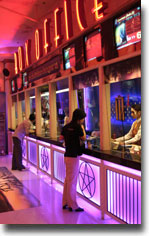Will Movie Tickets Soon Cost $150?
 George Lucas and Steven Spielberg know a thing or two about producing blockbuster movies. So when these hugely successful Hollywood veterans predict that the movie industry is on the verge of some radical economic changes, it’s worth taking note.
George Lucas and Steven Spielberg know a thing or two about producing blockbuster movies. So when these hugely successful Hollywood veterans predict that the movie industry is on the verge of some radical economic changes, it’s worth taking note.
On June 12, Lucas and Spielberg took part in a panel discussion at the University of Southern California’s School of Cinematic Arts. The two men first met in 1967, when an 18-year-old Spielberg saw Lucas’ debut feature THX 1138 at a student film festival at UCLA.
At the recent USC discussion, Spielberg and Lucas predicted a film industry “implosion” and warned that Hollywood’s current trend of big-budget action movies and the industry’s expectations of huge profits could have serious consequences. A number of media sources including The Hollywood Reporter and Variety discussed some of the content of what Lucas and Spielberg said, including that the movie studios will soon be experimenting with increasing ticket sales to see what the market will bear.
Lucas asserted that a major contributing factor that will cause the cost of movie going to skyrocket will be the “an implosion where three or four or maybe even a half-dozen of these mega-budgeted movies go crashing into the ground, and that’s going to change the paradigm again.” After that, Lucas predicted the creation of a much higher-priced sector of movie theaters. He went on to say that the result will also mean fewer theaters, although the bigger theaters will be plusher with a lot of costly accoutrements. He forecasted, “Going to the movies will cost 50 bucks or 100 or 150 bucks, like what Broadway costs today, or a football game.”
Lucas and Spielberg also believe that most movies and TV series will be offered with video-on-demand streaming services. Lucas said, “What used to be the movie business, in which I include television and movies . . . will be Internet television.” Industry analysts have previously suggested that this will spell the end of cable as we know it.
According to Spielberg, studios would rather pour $250 million into one movie to have a shot at a mega-blockbuster than invest in personal, interesting, or historical projects that can get lost in the hubbub of a entertainment-saturated world.
Some theatre chains already have a similar model to the upscale movie theatres Lucas was talking about. For example, in Singapore, Golden Village is a theatre chain with multiplex locations housing 87 screens islandwide. Many of their theatres have special screening rooms where ticket prices are considerably higher than the seating in standard areas of the theatre. These rooms feature around 30 special reclining seats and food is served to patrons by waiters. According to their website, these services represent “the ultimate in luxury movie viewing with a private lounge and plush electronic recliner seats comparable to First Class airline seats . . . a 5-star food and beverage menu available (including a top wine list) and a private dining room. The Gold Class cinema seats are all equipped with call buttons for faster and more discreet service. A new level of concierge-style service, hitherto unseen in Singapore cinemas, will be enjoyed by patrons from the moment they arrive all the way through their patronage experience.”
There are a number of high-end theatre chains in the U.S., although nothing quite as extravagant as Singapore. The iPic theatres (located all over the U.S.) each have a restaurant and bar. You can dine there or bring your food and drink into the theatre. The Tanzy restaurant at the Scottdale iPic features a 10 oz filet mignon for $35. Additionally, premium reclining seats are available for around $30.
If Lucas and Spielberg are correct, the high-end movie theatre model may be coming to a movie theatre near you complete with movies aimed more focused at satisfying the studio’s bottom line than producing anything approaching quality cinema.